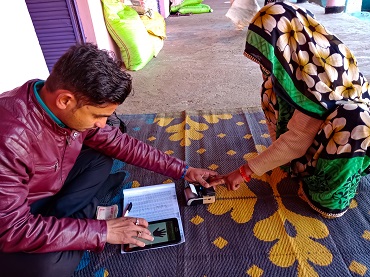Blog
Why is finance critical for an equitable and robust recovery post-COVID?

This is a summary of the Sneak Preview of the World Development Report 2022: Finance for an Equitable Recovery. On September 30th, WDR Director Leora Klapper and Lead Author Martin Holtmann made a special advance presentation, hosted by Matthew Gamser, CEO of the SME Finance Forum, sharing findings of the upcoming 2022 World Development Report (WDR). The WDR is a flagship publication of the World Bank Group, aiming to be a practical guide—grounded in research and real-world experience—for low-and-middle-income countries to develop strategies to strengthen financial markets for a more equitable recovery from the COVID-19 economic crisis. Through analysis, frameworks, and case studies, the report assesses the financial and economic impacts of COVID-19 on households, businesses, banks, and governments. The WDR also provides recommendations for addressing financial fragilities as nations rebuild.
Leora Klapper, the WDR2022 Director and the Lead Economist in the Finance and Private Sector Research Team of the Development Research Group at the World Bank, first shared the big picture of WDR2022. She mentioned that, during the first year of the pandemic, the world economy shrank by about 4%. And global poverty increased for the first time in a generation. An estimated 15 million people slipped into poverty. The new research data collected by the WDR team shows that financial regulations around the world implemented an unprecedented set of measures to address the distress of the financial sector. To fund these policies, the average stock of government debt increased 7.4% of GDP in 2020, in contrast to an annual average increase of about 1.8% of GDP during the 2019 period. Leora also pointed out that financial risks are likely to manifest more quickly in emerging markets as half of all households in emerging markets would not be able to self-sustain beyond three months pre-crisis.
Examining the central role of finance in the aftermath of the COVID crisis in charge of pathways for robust and equitable recovery, the World Development Report indicates that the worst financial economic effects of the COVID 19 pandemic might still be ahead of us as governments will soon start unwinding support measures and lifting the moratorium and regulatory forbearance, which may trigger a surge in loan defaults and insolvency. Thus, timely and holistic policy decisions can decrease risks and turn the vicious cycle caused by cross-sector linkages into a virtuous one.
Martin Holtmann, the WDR2022 Lead Author and Global Sector Manager for Financial Inclusion, MSME Finance, and Digital Finance at IFC, shared more details on how to use finance to get through the COVID crisis and the keys to build back better. Martin indicated that evaluating the impact of the crisis and finding ways out of the crisis are like climbing a mountain in the morning. You may have sunshine on top of the mountain, but down in the valley, there's a lot of fog. Lenders have experienced the same situation throughout the pandemic. Visibility has gone down when COVID generated huge numbers of business failures and reductions in cash flows. The past is no longer a good predictor of the ability and the willingness to repay. At the same time, recourse is much harder due to the impact of moratoria. And when a loan goes into default, it's tough for lenders to seize the prices of assets.
One of the surveys that WDR team conducted was on quarterly credit standard trends in 30 countries, including emerging markets. By asking credit officers and banks which way their credit standards are going, the WDR team saw a strong trend of tightening credit standards during the crisis. For example, in Mexico, firms reported higher costs, shorter tenors, smaller amounts, longer decision making, and higher collateral requirements, indicating that it's becoming harder for them to get access to credit.
Another survey done among the SME Finance Forum members in May 2020 showed that nearly half of the lenders had stopped lending to new customers. As risk or perceived risk went up, there was a flight to safety lending standard. Moreover, in Poland, there was ashift in the product mix to installment loans that were perceived less risky. In this case, the installment loans price stayed pretty stable, whereas cash loans, which had a higher risk attached to them, went down very significantly.
However, there might be a silver lining in the pandemic. COVID really provided a lot of tailwinds for digitization. Data from Kenya prove that more and more transactions have been moved onto the digital rail setting. Many clients are also knocking on the door and asking how they can move even faster on their digitalization journey. The WDR points out several suggestions for lenders to improve visibility, strengthen recourse, and mitigate credit risk, including utilizing alternative data, machine learning, credit guarantee, etc. The WDR also recommends policymakers to welcome new providers, products, and new types of data and analysis, to ensure consumer protection, and to upgrade infrastructure to facilitate operational resilience and access. Furthermore, supervision needs to react to the evolving scope and diversity of the financial sector. Martin finally stressed that collaborations among regulators are important. But the use of government guarantees should be very selective, as guarantees can be a very blunt instrument.
As the economic disruptions to firms and households due to the pandemic echo in non-performing loans and defaults, proactive approaches to managing credit market disruptions will be essential for recovering. The report presents resolution strategies for lenders and debt restructuring approaches for households and firms, including in-court and out-of-court options to reduce debt burdens and pave the way for recovery. Of particular interest to SMEFF members, the report examines how lenders can respond to the increased risk and reduced visibility of the pandemic lending environment, and how policymakers can foster innovations in lending alongside well-designed government support programs.
Read more here>























